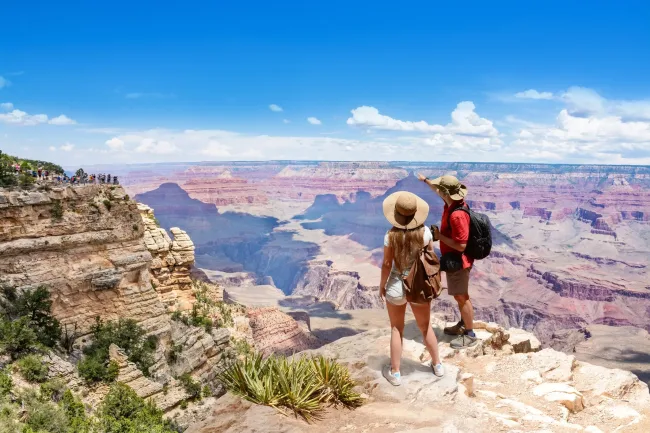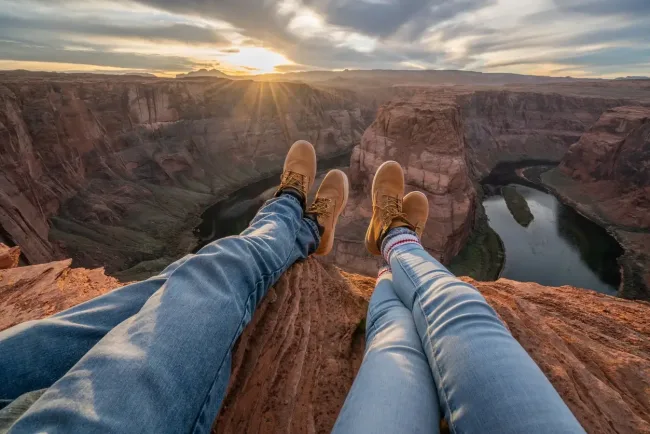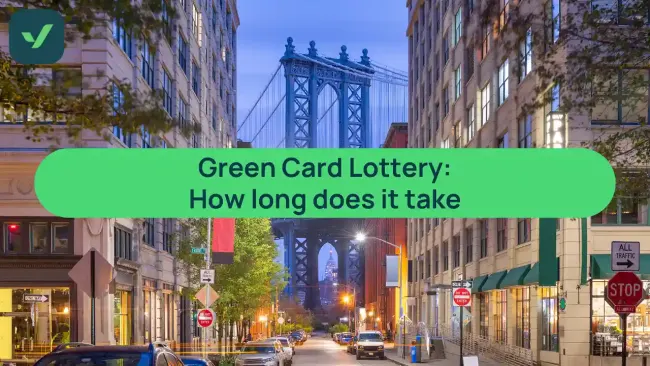
United States
Welcome to United States
Traveling to the United States? You may need a visa – find out if you do, which type, and how to apply so you can get the paperwork out of the way and focus on your trip.
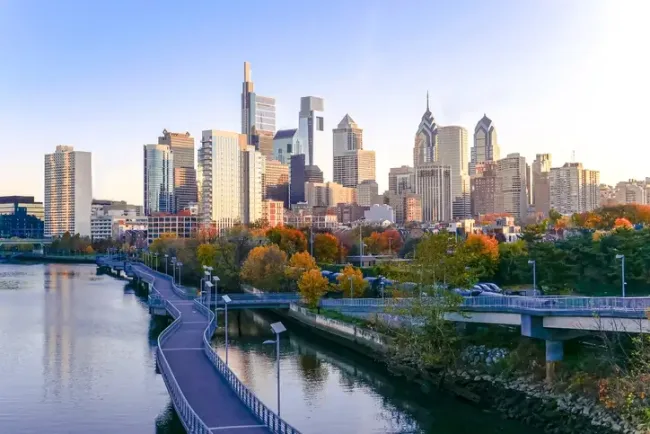
What’s a United States B1/B2 Visa and who’s it for?
Who’s the U.S. B1/B2 Visa for? Travelers from countries not in the Visa Waiver Program, mainly from Africa, Asia, and Latin America.
Who isn’t eligible for the U.S. B1/B2 Visa? Citizens of Visa Waiver Program countries, individuals seeking U.S. employment, study, permanent residence, or those with past visa violations. Check your eligibility with our Visa Checker Tool.
What’s the purpose of the U.S. B1/B2 Visa? The United States B1/B2 Visa facilitates travel to the U.S. for:
-
B1 (Business): Attend meetings and conferences, negotiate, or conduct business research. Not for employment in the U.S.
-
B2 (Tourism): Enjoy tourism, visit friends or family, receive medical treatment, or participate in social events. Excludes employment or business activities.
How long can you stay with the United States B1/B2 Visa? These visa types are typically issued for six months but can be extended. You can come in and out of the country, i.e., multiple entries are allowed.
Remember that providing detailed and complete information increases your chances of approval. Read our US Visa rejection guide to learn more about common mistakes when applying for your US Visa.
What’s a United States DV Lottery Entry Form and who’s it for?
Who’s is the United States DV Lottery for? This visa lottery (sometimes called the green card lottery) is to individuals from countries with low U.S. immigration rates.
What’s the purpose of the United States DV Lottery? It offers the opportunity to enter a lottery to get U.S. permanent residency (Green Card), enabling work, study, and living in the United States.
- Key points:
-
Random selection: Annual random selection from all qualified entries.
-
Eligibility: Must be from a qualifying country, with a high school education or equivalent, or two years of qualifying work experience.
-
Application period: Brief annual window. When applying with us, we’ll automatically fill out the information for the next upcoming window.
-
Visa limit: There’s an annual cap with regional allocations.
-
Permanent residency: Winners can get permanent resident status.
-
Family inclusion: Includes visas for spouses and unmarried children under 21.
How long can you stay when winning the U.S. DV Lottery? It grants permanent residency and requires staying in the U.S. at least six months per year to maintain your status.
What’s the United States ESTA and who’s it for?
Who’s the United States ESTA for? For people from Visa Waiver Program countries like Australia, France, Japan, and the UK, among others. It makes travel to the U.S. easier for short visits.
Who isn’t eligible for the United States ESTA?
-
If you've been to countries like North Korea or Iran after March 1, 2011, you can't use ESTA.
-
If you've been to Cuba after January 12, 2021, you're not eligible, except in specific cases.
-
Dual nationals of certain countries, including Iran or Syria, can't use ESTA.
If these apply to you, you'll need a visitor visa instead.
What’s the purpose of the United States ESTA?
-
Checking the security status of travelers.
-
Helping to make entering the U.S. quicker and easier.
-
Confirming that you can travel under the Visa Waiver Program before you visit.
How long can you stay with the United States ESTA? The ESTA is valid for 2 years after issued or until your passport expires. It allows multiple visits of 90 days per entry.
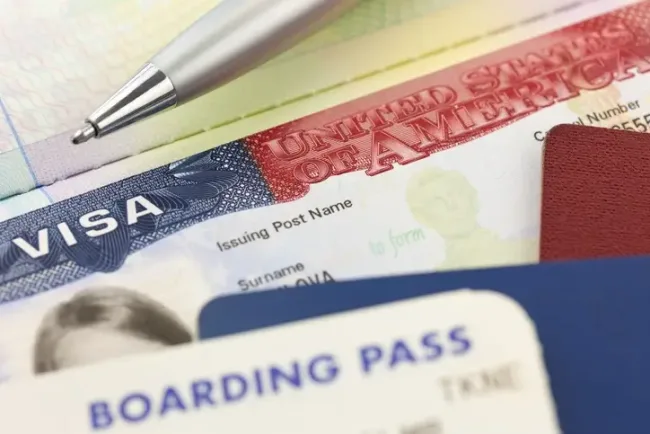
What’s a United States EVUS and who’s it for?
Who’s the United States EVUS for? The EVUS is specifically for Chinese citizens holding a 10-year B1/B2 visa for the United States, to keep information in the U.S. government system updated.
Who isn’t eligible for the United States EVUS? You can’t apply if you don't hold a 10-year B1/B2 visa, and aren’t from China. Additionally, holders of other types of U.S. visas or Chinese citizens with visas of shorter duration can’t enroll in the EVUS program.
What’s the purpose of the United States EVUS? Supports existing 10-year business and tourism visa information, ensuring their validity. Please note that It’s not a separate visa or meant for employment in the U.S. You must update your details every two years as a Chinese citizen using EVUS.
Duration of stay? Valid for two years or until your visa or passport expires, allowing multiple entries per the B1/B2 visa conditions.
What is a United States Visa Láser (BCC) and who’s it for?
Who’s the United States Visa Láser (BCC) for?
-
Mexican citizens for brief U.S. border visits.
-
Must show ties to Mexico and return intent.
Who isn’t eligible for the United States Visa Láser (BCC)?
-
Non-Mexicans.
-
Mexicans traveling beyond border areas or over 30 days.
-
Those seeking to work, study, or live in the United States.
What’s the purpose of the United States Visa Láser (BCC)? The Visa Láser, or Border Crossing Card (BCC), is for Mexican citizens for short trips to U.S.-Mexico border areas, combining business and tourism.
How long can you stay with the United States Visa Láser (BCC)? Allows multiple entries and stays of up to 30 days per entry and is valid for 10 years after issued.
Learn more about the United States Visa Láser
What’s the United States Student F-1 Visa and who’s it for?
Who is the United States Student F-1 Visa for? International students admitted to U.S. educational institutions for degree, diploma, or certificate programs. Schools must be U.S. government-authorized for international students.
Who isn’t eligible for the United States Student F-1 Visa?
-
Applicants not accepted by U.S.-authorized institutions.
-
Those seeking non-academic or vocational training, except language courses.
-
People aiming for permanent U.S. immigration.
What’s the purpose of the United States F-1 Visa? The Student F-1 Visa is a non-immigrant visa for international students attending various academic institutions in the U.S., including language training programs.
-
Permits academic study in the U.S.
-
Allows stay for the course duration, plus authorized post-completion training.
-
Enables limited on-campus work; off-campus work is highly restricted.
How long can you stay with the United States F-1 Student Visa?
It’s tied to the educational program's length and permits entry to the U.S. from up to 30 days before the program start date.
You can stay for 60 days after program completion. The visa may specify single or multiple entries based on your nationality and individual circumstances.
Learn more about the United States F1 Visa
What are the USA Long-Term Visa options and who are they for?
The United States offers several long-term visa options for various purposes, such as employment, study, business, and residence. Here are some of the common long-term visas:
-
Academic Visas for long-term educational programs and research fellowships: Issued for participation in long-term educational programs and research fellowships at U.S. institutions.:
-
Employment Visas: For individuals who have secured a job in the U.S., often requiring employer sponsorship.
-
Family Reunion Visas: Designed for family members of U.S. citizens or permanent residents seeking to live together in the U.S.
-
Retirement Visas: Provided to retirees who meet specific financial criteria to reside in the U.S. without employment.
-
Investor Visas: For individuals investing a significant amount of capital in U.S. businesses.
-
Artist and Cultural Visas: Tailored for artists, performers, and entertainers coming to the U.S. for cultural exchanges or performances.
-
Humanitarian Visas: Offered to individuals seeking refuge, asylum, or protection due to humanitarian crises.
-
Research Visas: Granted to researchers working on specific projects, often in academic or scientific fields, in the U.S.
-
Entrepreneur Visas: For entrepreneurs establishing or managing a business in the U.S., often requiring a substantial investment.
At iVisa, we currently don’t offer these visas, but you can find out more from the U.S. Department of State.
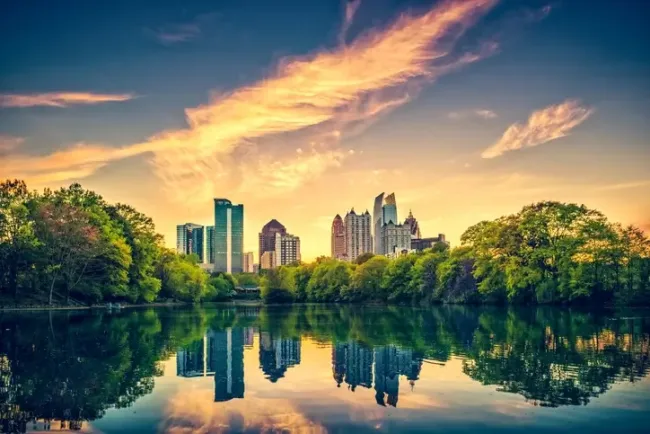
Staying healthy in the United States: Here’s what you need to know
Planning a visit to the United States? Stay informed with essential health guidelines for a worry-free trip. Here's what travelers should know.
Make sure to stay updated on routine vaccines
-
Keep updated with the United States' COVID-19 requirements, such as quarantine, testing, or vaccine certificates, through your airline or the Indian government website..
-
Some states require vaccinations like measles, mumps, and rubella, especially for long-term visitors. Check the local state health departments for specific vaccination policies.
-
Depending on travel plans, vaccines for Hepatitis A and B or Yellow Fever might be needed. Check the CDC's Travelers' Health page.
Medical facilities
-
Major cities and tourist areas typically have numerous options, including world-renowned hospitals.
-
Rural areas might have fewer facilities, and distance to the nearest hospital can be significant.
-
Services that might be free or low-cost in other countries can incur substantial charges in the U.S. Travelers should have comprehensive travel health insurance that covers medical costs in the the country. Many facilities require proof of insurance or upfront payment.
-
Prescription and over-the-counter medications are widely available at pharmacies.
Health insurance
We’d always recommend taking out health insurance before you travel anywhere from any destination. All the major cities in the United States will have private medical care, but it’s expensive. You should choose travel insurance with high medical limits.
Contact your insurance provider before traveling to make sure you have the right level of coverage.
Other things to consider:
-
Trip cancellation, delay, and interruption benefits.
-
Medical expenses and medical evacuation benefits.
-
Baggage coverage.
Things to be aware of when visiting the United States
- Weather: Be prepared for varying climate conditions across the U.S. In certain areas, take precautions against extreme temperatures and natural disasters. Always adhere to safety guidelines for outdoor activities.
Medication for personal use
Follow these tips to bring into the United States some over-the-counter medicines:
-
Declare all medications: Report all medication for personal use to customs authorities.
-
Original packaging: Always keep medicines in their original containers and in transparent bags in your hand luggage.
-
Prescription or doctor's letter: Present the medical prescription issued by your doctor or other competent authority, in English.
-
Check for restrictions: Call the embassy to verify that all of your prescription(s) are legal to bring with you.
-
Quantity aligned with itinerary: Bring only a reasonable quantity that aligns with your stay duration to avoid complications.

 Australia ETA Online
Australia ETA Online
 United Kingdom ETA
United Kingdom ETA
 India Tourist eVisa
India Tourist eVisa
 Canada ETA Visa
Canada ETA Visa
 Turkey eVisa
Turkey eVisa
 Egypt eVisa
Egypt eVisa
 Singapore SG Arrival Card
Singapore SG Arrival Card
 Indonesia eVoa Visa
Indonesia eVoa Visa
 Aruba ED Card
Aruba ED Card
